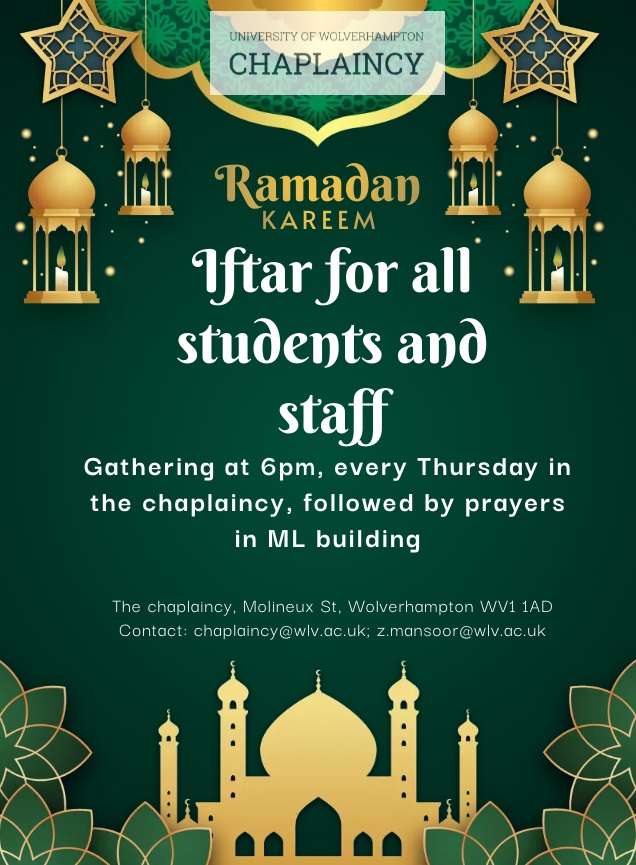Ramadan Iftars and advice for students and staff
Student shares meaning of Ramadan and invites students and staff to join in Iftars at the Chaplaincy.
Ramadan 2024 starts on Sunday 10 March, with Eid al-Fitr is expected to fall on Wednesday 10 March.
In the above video, filmed last year, international postgraduate student, Zinnia Mansoor, talks about fasting during Ramadan and what that means in terms of refraining from vices, and fostering positive and charitable habits which should carry on throughout the year. The ultimate goal of Ramadhan and fasting is to gain piety.
Daily fasts are typically broken with an Iftar meal, which may traditionally be shared with family and community. Throughout Ramadan, Zinnia will again be hosting Iftar meals at the chaplaincy, for those wishing to break fast on campus.
 Iftar for all students and staff
Iftar for all students and staff
Join the gathering at 6pm, every Thursday throughout Ramadan, at the Chaplaincy (Molineux St, WV1 1AD), followed by prayers in ML Building, City Campus. For information contact chaplaincy@wlv.ac.uk.
Unity Iftar - Walsall
Join local Muslims to open the fast during Ramadan with a delightful three-course meal while gaining insights into this sacred month. Thursday 14 March, Walsall Campus. Registration is mandatory to attend this event.
Advice for students during Ramadan
The following advice has been collated by FSE Academic Coaches to support students who are fasting during Ramadan.
Academic
- Plan approach to studies in advance.
- Identify times in the day when you are motivated and most energised to study.
- Prepare and start revising for any pending assessments as early as possible.
- Do you need to re-sit work from semester 1?
- Include time for regular breaks away from technology.
- Try different revision methods. Revise more often, for shorter periods of time.
- Study within a well-ventilated room.
Spiritual
- Choose sensible spiritual goals.
- Incorporate studies around your religious commitments.
- Use Tahajjud (night prayer) to motivate yourself for the day ahead.
- Access on-campus prayer facilities (ML Buildings, Student Union, Springfield, The Chaplaincy).
Nutrition
- Increase protein intake at suhoor and iftar.
- Try to limit sugary and fried food.
- Increase intake over water before and after fasting.
- Costume smaller but more frequent meals in the period where food is permissible.
Wellbeing and safety
- Remain active, both in the body and mind.
- Stay positive and listen to the changes affecting your body.
- Meet with friends for support and companionship.
- Reflect on blessings to help build resilience.
- If you have a health condition, seek advice from your doctor.
- Download the free SafeZone app for support with on-campus health or safety emergencies.
Factsheets
- Access the above information as a pdf. factsheet: Advice for fasting students
- General information and advice for Supporting Muslim students during Ramadan
- Further information: Ramadan heath factsheet 2024
Share your special days
Sharing and celebrating occasions that are meaningful to ourselves, our cultures and our communities can help us all feel a strong sense of belonging, and help us to better understand one another. Students are invited to help decide which days and seasons we celebrate as a University community by completing this short form: My Special Days.
For more information please contact the Corporate Communications Team.


/prod01/wlvacuk/media/departments/digital-content-and-communications/images-2024/240328-Varsity-Line-Up-Resized.jpg)
/prod01/wlvacuk/media/departments/digital-content-and-communications/images-18-19/220325-Engineers_teach_thumbail.jpg)
/prod01/wlvacuk/media/departments/digital-content-and-communications/images-2024/240515-Spencer-Jones-Award-Resized.jpg)
/prod01/wlvacuk/media/departments/digital-content-and-communications/images-2024/240320-Uzbekistan-Resized.jpg)
/prod01/wlvacuk/media/departments/digital-content-and-communications/images-2024/240229-The-Link-Resized.jpg)
/prod01/wlvacuk/media/departments/digital-content-and-communications/images-2024/240516-Andy-Gibson-Resized.jpg)